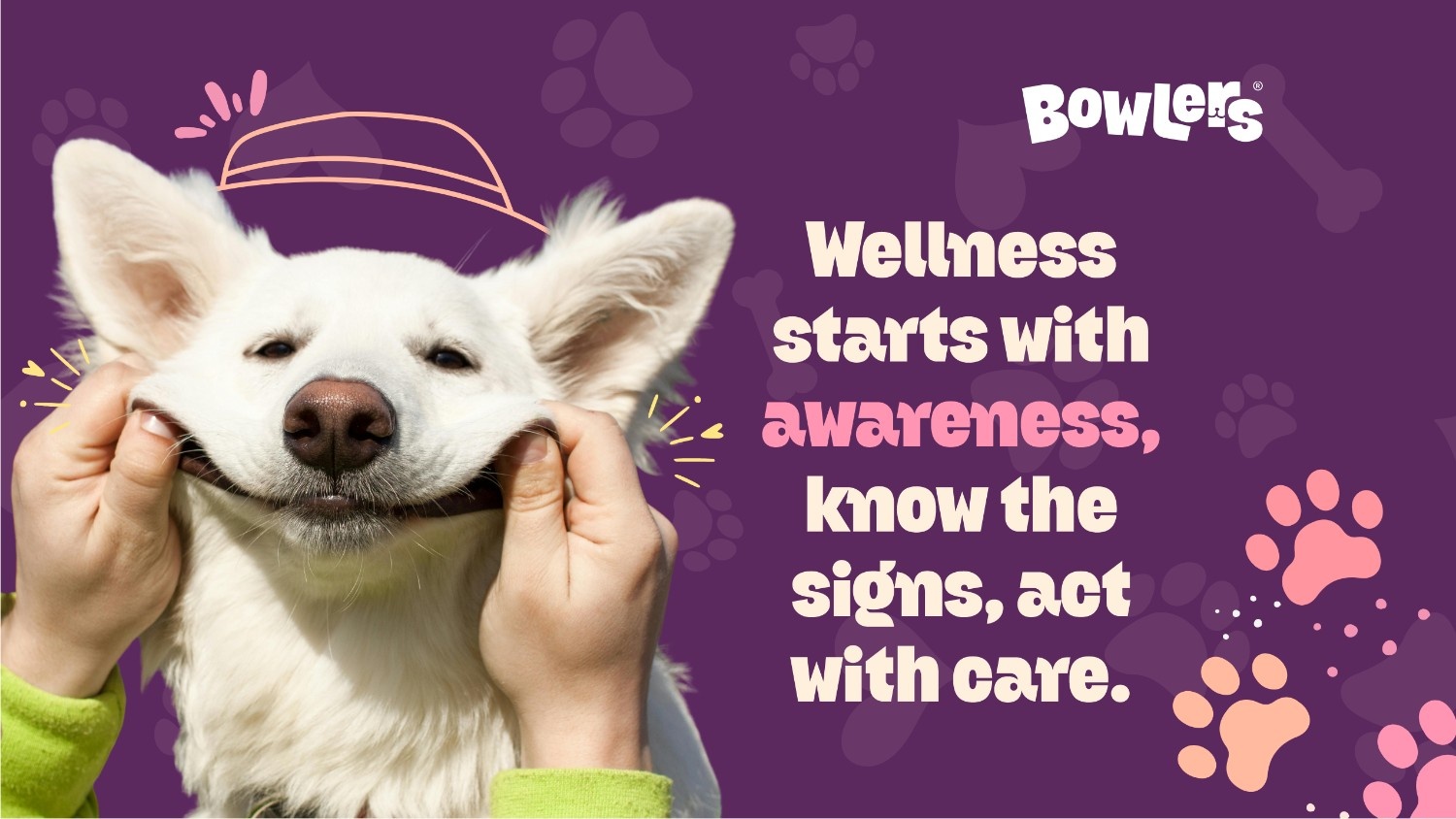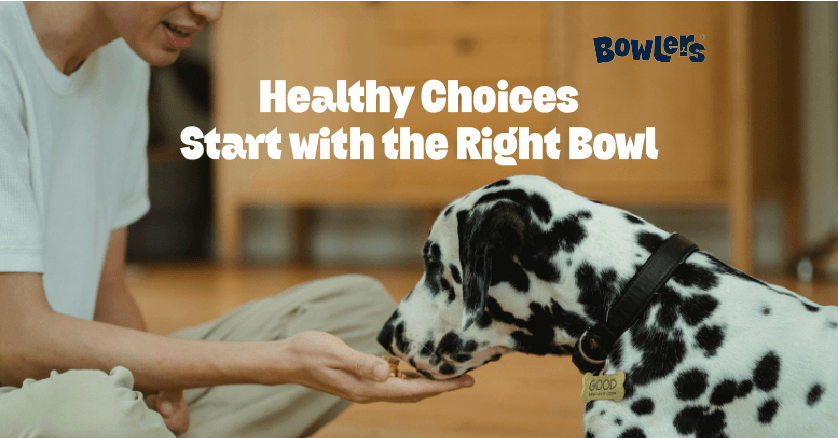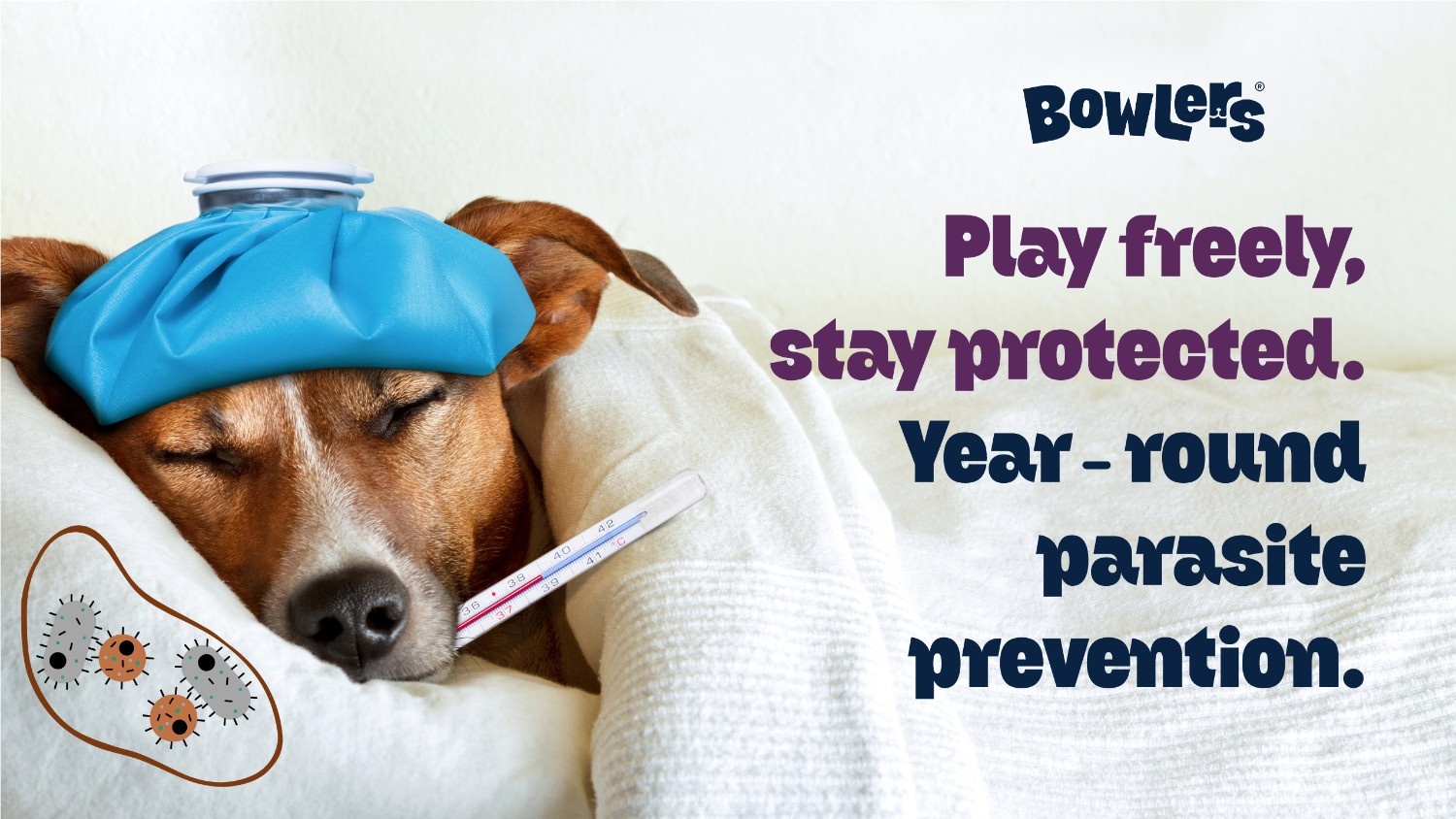8 Signs of a Healthy Dog (and Early Warnings of Trouble)

Table of contents
- 1. Bright Eyes and Clean Ears
- 2. A Shiny Coat and Healthy Skin
- 3. Consistent Appetite and Weight
- 4. Normal Bathroom Habits
- 5. Steady Energy Levels
- 6. Healthy Teeth and Fresh Breath
- 7. Steady Breathing and Heart Rate
- 8. A Positive Mood and Sociability
- Early Warning Signs in Dogs: When to Act Quickly
- Supporting Health Through Routine Care
As a loving dog owner, one of your biggest concerns can be ensuring your furry friend stays healthy and happy. While regular wellness check dogs with your veterinarian are essential, being able to spot dog health symptoms early at home can make all the difference between catching an issue before it becomes serious or letting it escalate.
Understanding the signs of a healthy dog helps you monitor their well being, while recognizing early illness signs in dogs ensures timely intervention and treatment. At Bowlers, we believe that knowledge is one of the most powerful tools for preventive dog healthcare, helping you support your dog’s long and active life.
In this guide, we’ll explore eight key indicators of good health, along with early warning signs that should prompt a vet visit. Whether you’re a new pet parent or an experienced one, these insights will empower you to know how if your dog is sick and take action before complications arise.
1. Bright Eyes and Clean Ears
A healthy dog’s eyes should be clear, bright, and free from discharge or redness. Cloudiness or excessive tearing can be a sign of irritation, infection, or more serious conditions like cataracts or glaucoma.
Similarly, clean ears are an important health indicator. Healthy ears are pale pink and odor-free. Watch for scratching, head shaking, or ear discharge, which may signal ear mites, allergies, or infections.
Learn more about regular vet visits that help catch these issues early in our guide: How Often Should You Take Your Dog to the Vet? A Complete Guide.
2. A Shiny Coat and Healthy Skin
A dog’s coat reflects their internal health. A glossy, soft coat with minimal shedding is a positive sign, while dry, flaky skin, bald patches, or excessive scratching could indicate allergies, parasites, or nutritional deficiencies. Feeding a balanced diet like Bowlers Nutrimax Club Adult, formulated to support skin and coat health, can help address these issues from the inside out.
Proper grooming, a balanced diet, and parasite control through Flea, Tick, and Worm Prevention can help maintain a healthy coat and skin throughout the year.
3. Consistent Appetite and Weight
Healthy dogs eat regularly and maintain a steady weight appropriate for their breed and size. Sudden changes in appetite—whether eating less or overeating—can be a red flag for underlying health problems such as infections, digestive disorders, or metabolic issues.
Pairing a nutritious diet with the right exercise routine, as outlined in our article How Much Exercise Does Your Dog Really Need?, helps your dog stay at an optimal weight and condition.
4. Normal Bathroom Habits
A healthy dog has regular bowel movements that are firm, well formed, and easy to pass. Diarrhea, constipation, blood in the stool, or difficulty urinating are signs that something may be off.
Proper hydration, a balanced diet, and regular vet wellness checkups ensure that your dog’s digestive and urinary health stays on track.
5. Steady Energy Levels
Dogs naturally have periods of rest and activity, but overall energy levels should remain consistent. A healthy dog enjoys playtime, walks, and interaction without excessive fatigue.
If your dog becomes unusually lethargic, reluctant to move, or exhibits difficulty getting up, it could be an early illness sign such as joint pain, infection, or more serious systemic issues.
6. Healthy Teeth and Fresh Breath
Oral health is often overlooked but is a critical component of your dog’s well being. Healthy gums are pink, and teeth are free from tartar buildup. Bad breath, drooling, or difficulty chewing can signal dental disease, which may affect other organs over time.
For practical tips on maintaining dog dental health, check out our guide: Dog Dental Care 101: Brushing, Chews, and Vet Visits.
7. Steady Breathing and Heart Rate
Normal breathing should be calm and effortless. Rapid breathing, coughing, or labored breaths can be warning signs of respiratory or cardiac issues.
Similarly, an irregular heartbeat or pale gums may signal circulatory problems that require immediate veterinary attention.
8. A Positive Mood and Sociability
A healthy dog generally displays curiosity, friendliness, and responsiveness to their environment. Dogs that retreat, show signs of anxiety, or suddenly become aggressive may be experiencing pain, stress, or neurological issues.
Maintaining a structured environment with regular play, exercise, and mental stimulation can help promote a stable and positive mood.
Early Warning Signs in Dogs: When to Act Quickly
In addition to monitoring for positive signs, it’s essential to stay alert to early illness signs in dogs, such as:
✔ Loss of appetite or excessive thirst
✔ Vomiting or diarrhea lasting more than a day
✔ Persistent coughing or sneezing
✔ Swollen limbs or joint pain
✔ Excessive licking or scratching
✔ Sudden weight loss or gain
✔ Changes in behavior or mood
✔ Difficulty breathing or limping
If you notice any of these symptoms, it’s best not to wait. A prompt visit to your veterinarian can make all the difference in preventing complications and ensuring a smooth recovery.
Learn more about scheduling wellness check dogs and vet consultations in our article: How Often Should You Take Your Dog to the Vet? A Complete Guide.
Supporting Health Through Routine Care
Recognizing both healthy and concerning signs is only part of the equation. Supporting your dog’s well being requires consistent attention through:
✔ Nutritious meals designed for your dog’s breed and life stage
✔ Regular exercise tailored to their age and energy needs
✔ Year round parasite prevention strategies
✔ Routine dental care
✔ Scheduled vet visits for vaccinations, screenings, and blood tests
By integrating these habits into your daily life, you not only support your dog’s current health but also build resilience against future illnesses.
Monitoring dog health symptoms is a proactive way to ensure your dog enjoys a long and happy life. From clear eyes and a shiny coat to steady energy levels and normal bathroom habits, the signs of a healthy dog are often visible if you know what to look for.
At the same time, being alert to early illness signs in dogs empowers you to seek treatment before conditions worsen. Regular wellness check dogs, combined with proper diet, exercise, dental care, and parasite prevention, forms the foundation of comprehensive preventive dog healthcare.
At Bowlers, we encourage every pet parent to stay informed and attentive. By recognizing the subtle changes in your dog’s behavior and appearance, you create a nurturing environment that supports their well being every step of the way.


